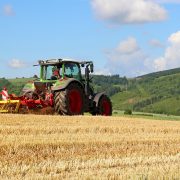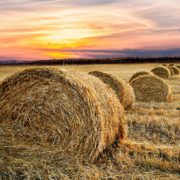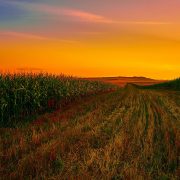Five Things You Need to Know Before Investing In Agriculture
Many people are hesitant to invest in agriculture, especially those that don’t have much experience in the land industry. A common assumption is that only farmers know enough about agriculture to confidently invest in it. However, agriculture can be a great investment for people of all walks of life. Before you take out your checkbook, here are five things you need to know about investing in agriculture.
1: More Than One Way to Invest
There are many ways to profit off agricultural land and you can do many of them simultaneously. Investors can make money off of the returns of the annual crops. Additionally, good quality land historically increases in value over time, so just holding the land can provide returns as it increases in value. If you want to see your investment grow faster, you can:
- Build improvements on the land (buildings, structures)
- Switch to organic farming
- Grow more profitable, in-demand crops
2: Agriculture Is A Hedge Against Inflation
Food historically increases in price over time, which allows agriculture to be a hedge against inflation. A hedge against inflation is an investment that is protected against the detrimental cost of inflation to an investment.

Future population growth is also a benefit to investing in agriculture. As the world’s population is expected to grow to 9.8 billion by 2050, there will be an ever-increasing demand for food. Global food production will need to increase dramatically to feed the growing population. This increase in demand could cause an increase in the value of crops and the land they grow on as supply decreases, providing insurance that there will be room for your investment to grow.
3: Long Term Investment
When the economy is good, like it is now at the time of this publication, people often put all their money in high-risk, high-reward stocks that offer quick and large returns. Crops need time to grow and flourish. Some crops, such as pecan trees, take three to four years to produce and often don’t reach full production potential until the tenth year. However, there will always be a steady demand for food, so this investment can add slow, steady growth to your savings. It can be easy to gravitate towards the get-rich-quick stocks, but investing in safe, slow-return stocks is important for the overall health of your investment portfolio.
4: Crop Insurance Protects Investors
With talks of trade wars and bad weather impacting the 2019 planting season, you might be hesitant to invest in agriculture. However, crop insurance was created to protect investors as well as farmers. If crops are destroyed due to natural causes or the price of the crops decline, the farmer still receives funds from the insurance so that investors can still collect their annual returns.

5: Diversify your portfolio
Investing in agriculture is a great way to diversify your portfolio. Much like timberland, agriculture doesn’t mimic the patterns of the stock market, giving your portfolio some much-needed protection against recessions. If you invested all your money in stocks and a recession hit, you could lose most of your investment. Agriculture is typically considered a safe, low-risk stock that can provide reliable returns and can be an excellent safety net for your financial future.
Agriculture shouldn’t be viewed as an investment only for industry insiders. Agriculture has been one of the biggest industries in America for millennia and has so much to offer investors. Investing in agriculture can be a great investment for your future.
Looking to buy agricultural land to invest in? Be sure to work with an experienced and qualified land expert in your area to find the perfect plot to invest in. If you click on the Advanced Search button, you can check the Agricultural/Farm Land option under Property Specialties to find an agent with experience in agricultural land.
About the Author: Laura Barker is a freelance writer based out of California for the REALTORS® Land Institute. She has been with RLI since October 2017.













I can’t wait to finally buy my first (physical) piece of farmland. Right now I’m only invested in farmland through stocks, but once I find the right opportunity to buy the right piece of farmland, I’m taking it.
It’s great that you talked about how important it is for investors to protect their crops with insurance. My uncle is thinking about investing in farming. He wants to make more money and help his community. That’s why I think it’s important that he reads this piece. I appreciate you helping me learn more about what you need to know before investing in agriculture.
Hello,I am very glad that I read your materials on agriculture,its future benefits and inherent risks.I am now an American and a Registered nurse.I was born in west Africa of parents who were subsistence farmers and I also grew up helping my parents grow the meager food for the family that sometimes couldn’t sustain us through out the year because both the farming method and farm implements(equipments) used were poor in quality,thus resulted in low yields.Base on my passion for food production and also the desire for retirement savings and continuing to be active after employment, I embarked on an agriculture project in Liberia ,west Africa where I am originally from thus acquiring a little above 200 acres of farm land mainly planting cocoa which is consider cash crops,this project has also provided some form of income for locals within that community.But from the onset of this project until I read your composition on agriculture,I have never thought of the idea of farm or yield insurance which is also not popular to Where I am farming.
My question now is that how can I acquire farm insurance and other farm consultancy that will better protect my investment,farm yield,and attract better buying price.I look forward to your response hoping that it will be a life safer of my farm and investments.